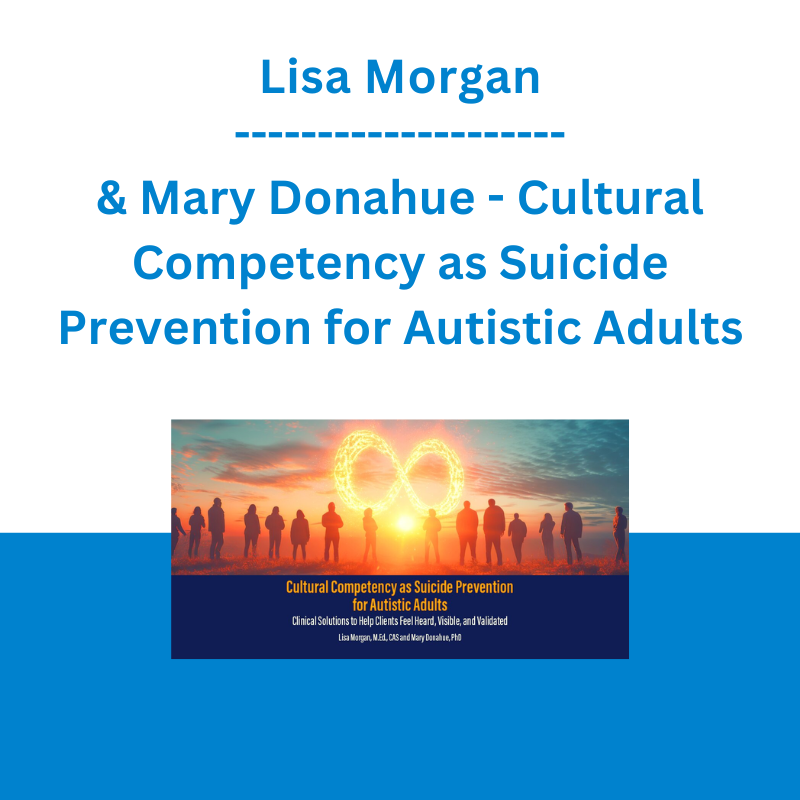*** Proof of Product ***
Exploring the Essential Features of “Lisa Morgan & Mary Donahue – Cultural Competency as Suicide Prevention for Autistic Adults: Clinical Solutions to Help Clients Feel Heard, Visible, and Validated”
Speakers:Lisa Morgan, MEd, CAS | Mary Donahue
Duration:2 Hours
Format:Audio and Video
Copyright:Apr 18, 2024
Description
Discover the unique challenges faced by autistic adults, where 66% experience suicidal ideation, surpassing general population rates and rapidly increasing. Traditional clinical treatments often lead to unintended harm, leaving individuals feeling unheard, invisible, invalidated, and confused—significant factors in this form of harm.
Join Mary Donahue, PhD, and Lisa Morgan, MED, CAS, for an enlightening training on embracing autism as a culture. Through a lens of cultural competency and humility, learn how to skillfully:
- Understand and navigate the autistic perspective
- Recognize warning signs of suicide in autistic individuals
- Validate and support the experiences of autistic clients
- Apply culturally competent suicide prevention interventions
Transform your approach to autism care and prevent unintentional harm. Register now for this essential session!
Speaker
Lisa Morgan, MEd, CAS
Lisa Morgan, MEd, CAS, is a consultant specializing in crisis support and suicide prevention for autistic people. Lisa is founder and co-chair of the Autism and Suicide committee at the American Association of Suicidology (AAS) and has developed several autism specific resources for communicating and supporting autistic people in crisis. A self-advocate with a passion for strengths-based solutions, Lisa has authored several books, articles, and resources all available on her website, www.autismcrisissupport.com. She is a community council member of AASET (Autistic Adults and other Stakeholders Engaged Together), a group of autistic adults informing autism research priorities. Lisa has a master’s degree in the Art of Teaching. She is a certified autism specialist, a peer reviewer of the online journal, Autism in Adulthood, and owner of Lisa Morgan Consulting, LLC.
Speaker Disclosures:
Financial: Lisa Morgan has employment relationships with AASET-SP, Hospice Foundation of America, and Lisa Morgan Consulting, LLC. She receives royalties as a published author. Lisa Morgan receives a speaking honorarium and recording royalties from PESI, Inc. She has no relevant financial relationships with ineligible organizations.
Non-financial: Lisa Morgan has no relevant non-financial relationships.
Mary Donahue
Mary P. Donahue, PhD, is a trauma-informed clinical practitioner, author, lecturer, consultant and advocate for various forms of interpersonal trauma such as childhood and adult sexual assault, interpersonal violence, neglect and other betrayals. The leads naturally to the autistic population. Dr. Donahue has authored several articles and books on mainstream/autistic interactions. She is a Certified Autism Spectrum Disorder Clinical Specialist, serves on various mental health boards, and advocates for the need to embrace different thinking when serving non-neurotypical individuals.
Speaker Disclosures:
Financial: Mary Donahue has an employment relationship with Mindful Paths Psychological Services, LLC and receives compensation as a consultant. She receives royalties as a published author. Mary Donahue receives a speaking honorarium from PESI, Inc. She has no relevant financial relationships with ineligible organizations.
Non-financial: Mary Donahue has no relevant non-financial relationships.
Objectives
- Recognize the differences in how autistic people think, communicate, and experience the world
- Demonstrate an increased understanding and acceptance of a need for cultural competency
- Apply culturally competent suicide prevention interventions in your clinical practice
Outline
Autism in Everyday Life: Lived Experience
- Unique challenges autistic people encounter every day
- Identify heterogeneity of autism
- Increased exposure to harm
- Risks and limitations of research and techniques
Cultural Competency: The Cure for Unintentional Harm
- Prioritize the differences in how autistic people think, communicate and experience the world
- Validate the experiences of autistic people
- Utilize the available autism specific resources
Making Mental Health Care Not Just Available, but Accessible
- Unique risk factors and warning signs of suicide of autistic people
- How to support the experiences of the autistic individuals
- Ways to validate the autistic person through cultural competence and humility
Cultural Crisis Supports and Suicide Prevention for Autistic People
- Recognize the unique risk factors of autistic people
- Assess autistic people using warning signs of suicide for autistic people
- Apply culturally competent supports and practical applications
Target Audience
- Licensed Clinical/Mental Health Counselors
- Social Workers
- Psychologists
- Marriage & Family Therapists
- School Administrators
- Speech-Language Pathologists
- Teachers/School-Based Personnel
- Case Managers
- Addiction Professionals
- Nursing Home/Assisted Living Administrators
- Occupational Therapists
- Occupational Therapy Assistants
- Nurses
- Physical Therapists
- Physical Therapist Assistants
- Dieticians
Please see the full list of alternative group-buy courses available here: https://lunacourse.com/shop/










 Jesse Livermore Trading System - Joe Marwood
Jesse Livermore Trading System - Joe Marwood